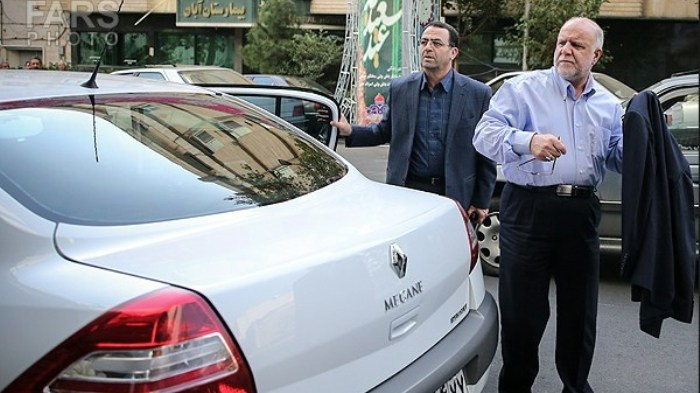Bijan to the Rescue?

(Photo: Fars News/ Sina Shiri)
When Hassan Rouhani introduced his cabinet to Majles, the Iranian parliament, in mid-August 2013, the most heated session focused on Bijan Zanganeh’s qualification for the petroleum ministry portfolio. Unlike other candidates, Zanganeh was not questioned about his management credentials, and little was asked about his conduct after the 2009 presidential elections. Critics were basically concerned that Zanganeh, although having a clean sheet himself, follows a style of management that exposes the country’s lucrative oil business to corruption.
Ahmad Tavakkoli, a senior conservative member of Majles, who eventually cast his vote against Zanganeh, admitted that the news of Zanganeh’s likely return to the ministry was warmly welcomed by the ministerial staff, yet he added that Zanganeh, although not being corrupt himself, has no will to fight corruption.
Other conservative critics were, and still are, less friendly towards Zanganeh. Alireza Zakani, another major conservative MP, put forth allegations of financial corruption in contracts signed with the Norwegian Statoil. Zakani minced no words in his criticism of Bijan Zanganeh: “all the flawed international deals after the Revolution belong to the Petroleum Ministry and have been signed during his ministry.”
The case viewed by conservatives as the ultimate fault in Zanganeh’s record is the Crescent deal. The deal first sparked off controversy in 2001, when Bijan Zanganeh served as Mohammad Khatami’s Minister of Petroleum, and since then has been a source of back-and-forth accusations. Principlists argue that the deal, supposed to transfer Iranian gas to the Emirate of Sharjah, has not only disregarded Iran’s economic interests, but also violated its sovereignty. Zanganeh and his defenders on the other hand see the fault in the handling of the case by Ahmadinejad’s government. Truth whatsoever, The Hague has judged in favor of the Emirati party and Iran has to pay Crescent Petroleum a significant amount in damages.
“I have stitched my pockets” Zanganeh told the parliament on the voting day to discard any allegations of corruption. “Don’t think you’re sending me to a five-star hotel if you cast a vote of confidence; you’re sending me to the war front to break [the barrier of the] sanctions,” he added.
When he entered office, Zanganeh started his own campaign to expose corruption in oil affairs. Tough sanctions against the Iranian oil industry imposed by the EU and the United States, along with sloppy handling of the Petroleum Ministry by Mahmoud Ahmadinejad (three of his candidates for the portfolio had failed to gain Majles’ vote of confidence and three were dismissed by himself) had pushed the oil sector towards crisis. Heavy reliance onmiddlemen to bypass sanctions had facilitated corruption, resulting in cases such as that of Babak Zanjani, a young merchant assigned with selling Iran’s oil who is yet to return 4 billion dollars of oil revenue to the government. The most recent case is ‘the missing oil rig’, purchased through brokers at the price of 87 million USD to be implemented in Iran’s oil fields, yet never having entered the country.
Opponents see Zanganeh’s successive release of corruption news as a smoke screen to divert attention away from the Crescent case, but it seems that the tide is in favor of Sheikh-ol-Vozara, the Elder of Ministers, for now. With the promising atmosphere created after the Vienna Deal and the noose around Iran’s oil industry going loose, Zanganeh’s mission has just begun. The ‘second foreign minister’ of the country, as he has been called, has to attract investments towards Iran’s capital-thirsty oil industry, and retake its position in OPEC at a time when oil prices are at their lowest in years. On his first day after returning to the ministry, Zanganeh picked up the phone and called offices across the Petroleum Ministry to inquire about the state of affairs; and he used no phonebook. He still knows the numbers by heart, and he probably knows the ropes.
By: Ali Attaran

